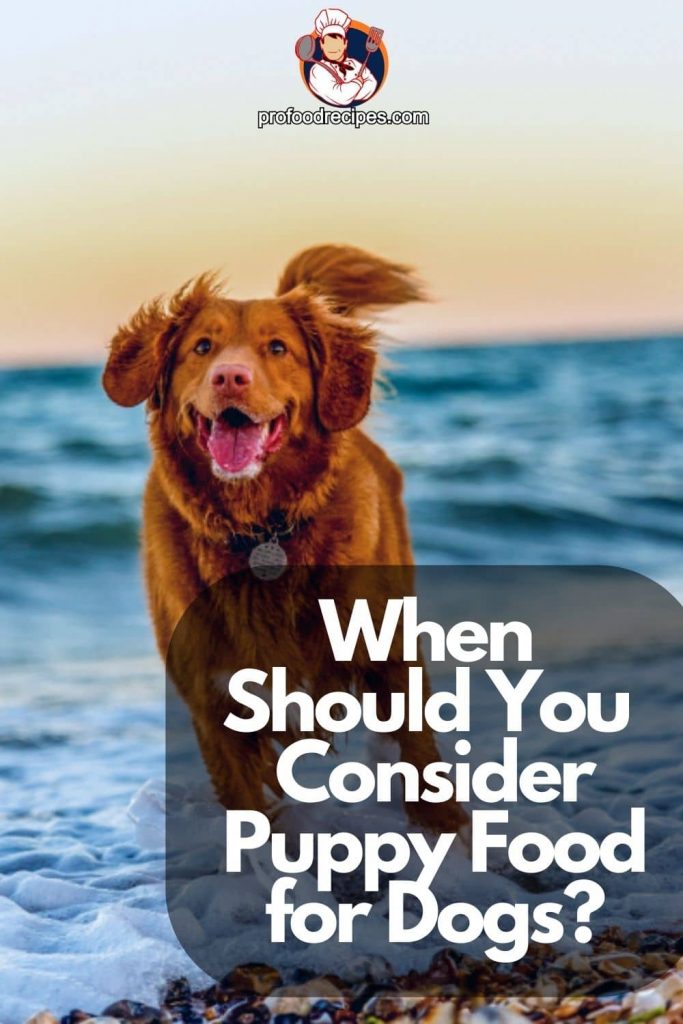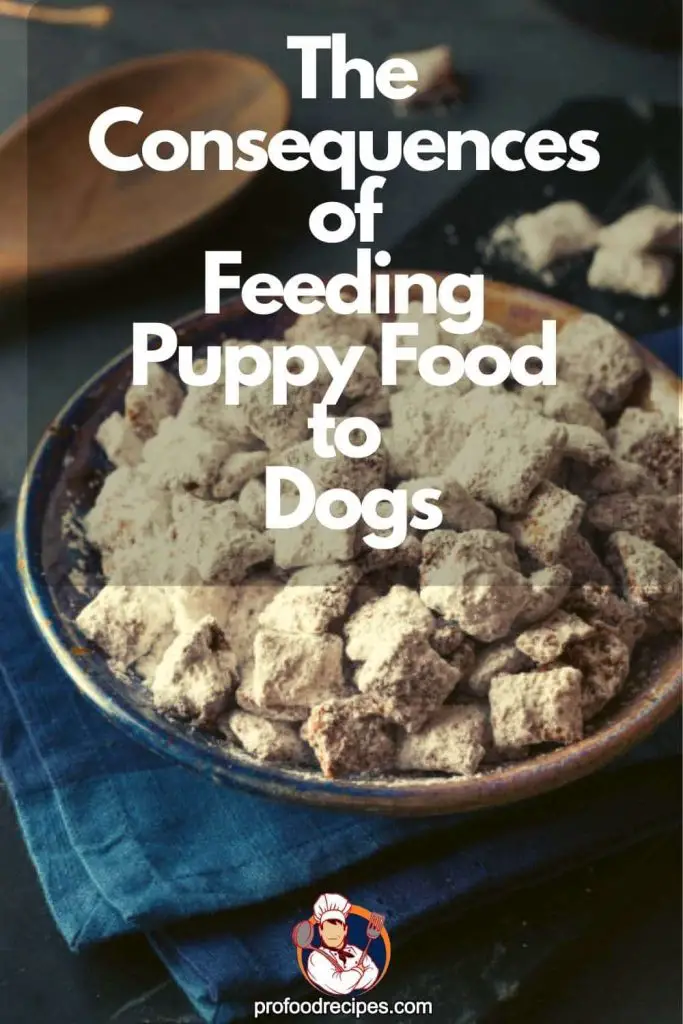Last Updated on June 19, 2022 by Amanda P. Brown
Dogs of all ages require the proper nutrition to thrive. It is essential to provide your adult dog with a completely balanced diet and sufficient nourishment to keep them healthy. When dogs reach adulthood, it can be challenging to maintain adequate nutrition on a regular diet.
Can an Adult Dog Eat Puppy Food? Yes, they can, but it is best to provide adult dogs with food specially formulated for their size and breed. Adult dogs have different dietary requirements than puppies.
Some exceptions exist when it comes to feeding high-calorie meals to adult dogs. Some mature dogs can eat high-calorie diets, whereas others cannot do so. However, the following article will provide further information on this topic.
Is Puppy Food Safe for Adult Dogs?
Table of Contents
Yes, but feeding them puppy food isn’t necessary. A modest quantity of puppy food is OK for an older dog. Yet, this shouldn’t become habitual for adult dogs for various reasons.
Puppy food is a type of food that aids in the development of animals. Feeding your adult dog puppy food on a regular basis can cause weight issues. Obesity is a common condition in dogs; therefore, feeding them high-calorie foods like puppy chow is not a brilliant idea since those calories lead to obesity. Switching your adult dog to puppy chow all of a sudden can also create gastric problems.
However, converting your adult dog to a new type of food is a simple procedure that starts with gradually introducing a new sort of meal. It won’t damage your dog if you do it a couple of times, but as I already stated, don’t make it a habit for them. However, if you detect any pain in a pet after switching him back to adult food for more than a day or two, you should immediately take him to the doctor.
When Should You Consider Puppy Food for Dogs?

There are situations where it is appropriate to feed your adult dog puppy food. Before making a significant nutritional shift, always get the advice of a veterinarian, especially if the subject is sensitive.
Underweight
As dog food for weight gain, puppy food plays an important role. If your adult dog needs to put on weight, puppy food is an excellent choice because of its high fat and protein levels. Though a variety of diets for your dog are explicitly designed for weight gain, many do not include the appropriate quantities of calcium found, like puppy foods. As a result, underweight adult dogs will benefit from high-calcium and high-protein puppy foods.
Also, several weight growth meals for underweight puppies include even more fat and protein to help them acquire weight. You need to note the risks of high calcium levels in this case.
“Weakness, listlessness, increased drinking and urine, and appetite loss,” which are a few symptoms according to VCA hospital. Prolonged hypercalcemia in dogs can cause bladder or kidney stones. Therefore, always ask your vet if it is suitable for your dog.
Weakness
Adult dogs often show signs of frailty from time to time; on this basis, puppy meals can feed. Although not every adult dog will benefit from puppy food, older dogs have different nutritional needs than puppies and adults. Again, some move less and require less energy, so low-fat diets help them. However, you should always think about your dog’s specific requirements.
Pregnancy and Weaning
Adult dogs require extra energy during pregnancy for several reasons. Puppies are building their bones and muscles during this period; therefore, pregnant dogs need additional nutrients and energy from their diets.
Mother dogs also demand extra energy for daily activities like playing and going for walks. This is why they require more calcium, fat, and calories, to fulfill their nutritional needs. In this situation, puppy food will be the best pick for them.
Furthermore, when the mother dogs produce milk, they require extra energy to ensure that the milk continues to be created for several weeks. Secondly, higher-quality milk makes the puppy healthier, so puppy food will be ideal for the mother dog and pups throughout pregnancy and after delivery.
The Consequences of Feeding Puppy Food to Dogs

Feeding your adult dogs too much puppy food has specific harmful implications.
An Overdose of Mineral
There should be at least 2.0 grams of calcium in puppy food and between 0.5 and 1.0 grams in the diet for older dogs. The quantity of calcium in the puppy food has already exceeded the maximum amount of calcium suggested for adult dogs. Even puppy chow has 18 grams of calcium, an increase of 17 grams.
Seventeen grams is significantly more than the amount advised for adults. As a result, feeding your adult dog an excessive amount of puppy chow might result in a mineral overload.
Obesity
Obesity is the most prevalent negative effect of feeding puppy food to an adult dog. The fat proportion in ordinary dog food rises to 22% in puppy food and 18% in regular dog food. Adults will retain a significant amount of fat that isn’t required for energy. They don’t need the extra fat percentages for growth because they’ve already grown to their optimal size. Consequently, they only use what they need and store the remaining as fat.
Why is Adult Dog Food Important?
People with pets should know they can’t give their animals whatever they want to eat. Adult dogs require a protein-balanced design diet to meet their nutritional requirements. Providing them with nutritious items is vital to maintain them robust, healthy, and productive. It is also the most effective method for preventing the spread of common diseases.
As a result, senior dog diets must be chosen with care. Adult dog food, like raw allergen-free or grain-free canine meals, necessitates ingredient adjustments according to the dog’s needs. Due to its lack of additives, Puppy food might throw his diet off and cause health or canine allergy concerns to flare up.
Does Puppy Food Cause Diarrhea in Adult Dogs?
Changing or adding new food to a dog’s diet can cause stomach discomfort. While feeding puppy food to adult dogs is acceptable, occasionally feeding puppy food to an adult dog can induce gastrointestinal upset. Puppy meals have more protein and fat than regular dog diets. Excess protein and fat can harm a dog’s digestive tract, resulting in diarrhea.
How Long Can an Adult Dog Eat Puppy Food?
The answer to this question relies on your dog’s breed; puppies reach adulthood at various age categories. Generally, when a puppy reaches his breed’s expected age, he should be moved from puppy to adult food. You should only feed a puppy for an older dog until it has acquired proper weight.
Additionally, you can try puppy food if your older dog is pregnant or weaning. However, gradually transitioning to a regular diet is recommended once he has stopped nursing the puppies.
Final Verdict
There are a variety of foods to feed senior dogs, but the improper meal might interfere with their lifestyle and have a detrimental impact on their health. Pet owners often worry about what to feed them and whatnot.
I simply want to tell all pet owners that our dog is just like ourselves; they require additional care, attention, and adequate nutrition to develop and stay healthy. Also, many pet owners have questions about Can an Adult Dog Eat Puppy Food? For those, this article will be helpful to their buddy.
You May Also Like to Read:
- What Vegetables Are Good for Rottweilers?
- Golden Retriever Food Guide
- 15-Healthy Vegetables for German Shepherd

